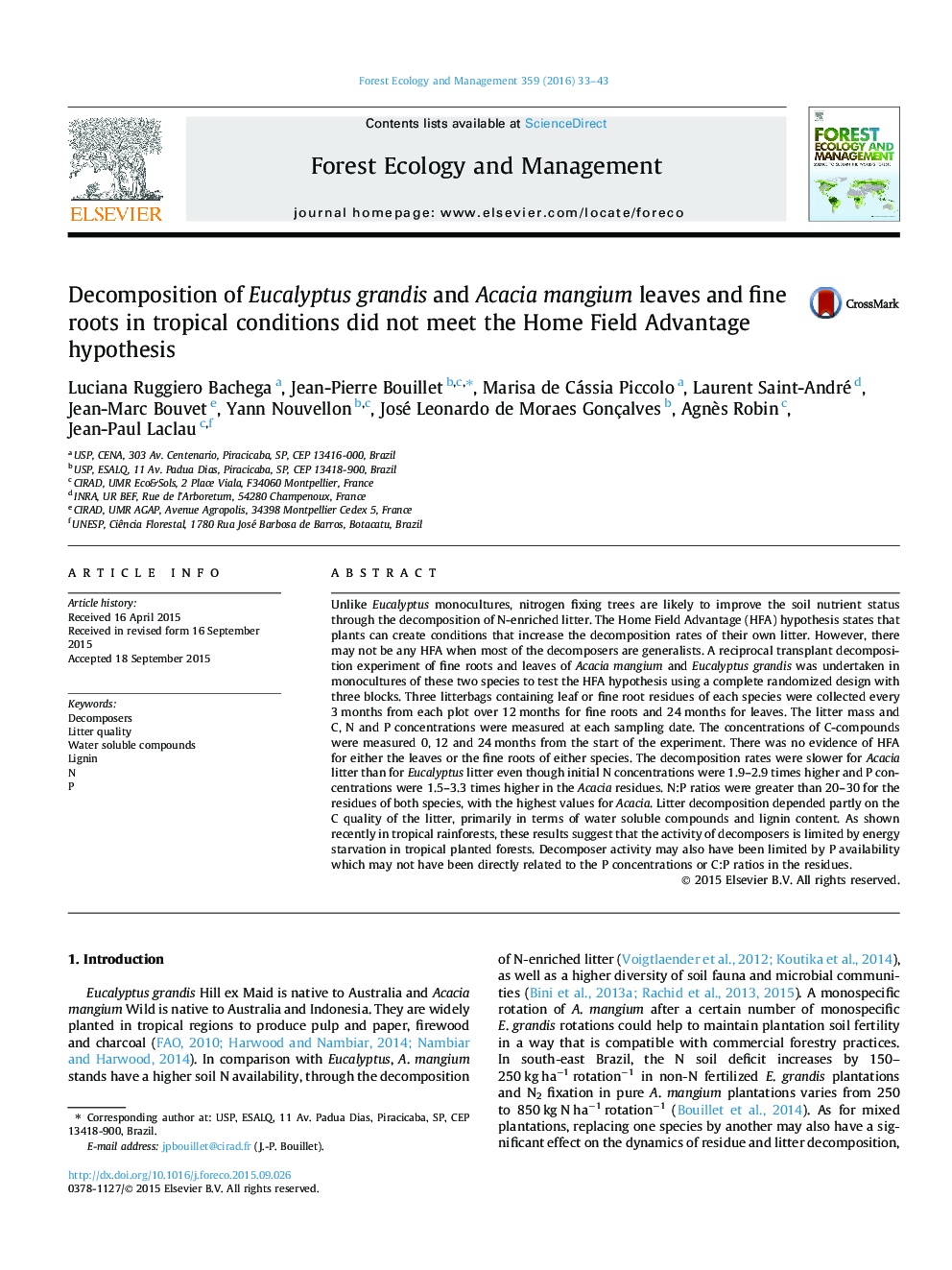| کد مقاله | کد نشریه | سال انتشار | مقاله انگلیسی | نسخه تمام متن |
|---|---|---|---|---|
| 6542614 | 159164 | 2016 | 11 صفحه PDF | دانلود رایگان |
عنوان انگلیسی مقاله ISI
Decomposition of Eucalyptus grandis and Acacia mangium leaves and fine roots in tropical conditions did not meet the Home Field Advantage hypothesis
ترجمه فارسی عنوان
تجزیه برگ های اکالیپتوس گرندیس و آکاسیا منگیوم و ریشه های خوب در شرایط گرمسیری فرضیه مزیت اصلی خانه را رفع نکرد
دانلود مقاله + سفارش ترجمه
دانلود مقاله ISI انگلیسی
رایگان برای ایرانیان
موضوعات مرتبط
علوم زیستی و بیوفناوری
علوم کشاورزی و بیولوژیک
بوم شناسی، تکامل، رفتار و سامانه شناسی
چکیده انگلیسی
Unlike Eucalyptus monocultures, nitrogen fixing trees are likely to improve the soil nutrient status through the decomposition of N-enriched litter. The Home Field Advantage (HFA) hypothesis states that plants can create conditions that increase the decomposition rates of their own litter. However, there may not be any HFA when most of the decomposers are generalists. A reciprocal transplant decomposition experiment of fine roots and leaves of Acacia mangium and Eucalyptus grandis was undertaken in monocultures of these two species to test the HFA hypothesis using a complete randomized design with three blocks. Three litterbags containing leaf or fine root residues of each species were collected every 3Â months from each plot over 12Â months for fine roots and 24Â months for leaves. The litter mass and C, N and P concentrations were measured at each sampling date. The concentrations of C-compounds were measured 0, 12 and 24Â months from the start of the experiment. There was no evidence of HFA for either the leaves or the fine roots of either species. The decomposition rates were slower for Acacia litter than for Eucalyptus litter even though initial N concentrations were 1.9-2.9 times higher and P concentrations were 1.5-3.3 times higher in the Acacia residues. N:P ratios were greater than 20-30 for the residues of both species, with the highest values for Acacia. Litter decomposition depended partly on the C quality of the litter, primarily in terms of water soluble compounds and lignin content. As shown recently in tropical rainforests, these results suggest that the activity of decomposers is limited by energy starvation in tropical planted forests. Decomposer activity may also have been limited by P availability which may not have been directly related to the P concentrations or C:P ratios in the residues.
ناشر
Database: Elsevier - ScienceDirect (ساینس دایرکت)
Journal: Forest Ecology and Management - Volume 359, 1 January 2016, Pages 33-43
Journal: Forest Ecology and Management - Volume 359, 1 January 2016, Pages 33-43
نویسندگان
Luciana Ruggiero Bachega, Jean-Pierre Bouillet, Marisa de Cássia Piccolo, Laurent Saint-André, Jean-Marc Bouvet, Yann Nouvellon, José Leonardo de Moraes Gonçalves, Agnès Robin, Jean-Paul Laclau,
